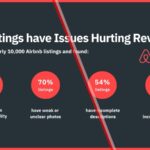At the recent Scale Show in Barcelona, Simon Tolson took the stage to share his expert insights on “Strategies for Recruiting Premium Properties and High-Value Owners.” Simon, a seasoned professional with two decades of experience in owning and managing full-service holiday agencies, provided a compelling session that captivated the audience with practical, real-world advice.
His session focused on recruiting properties that drive higher profits, highlighting the mindset and strategic shifts needed to achieve this goal. Notably, Simon shared a game-changing tip that added £100K to his bottom line. Below, we distill his presentation for those who couldn’t attend, ensuring you benefit from his invaluable wisdom.
Who is Simon Tolson?
Simon Tolson’s eclectic career path and extensive experience make him a trusted authority in the short-term rental industry. Before becoming a property expert, Simon was a software salesman, financial adviser, and property investor. Over the past 20 years, he has owned and run multiple holiday agencies, building them from scratch and achieving successful exits twice.
His full-service agencies have always focused on premium properties, catering to high-value clients and delivering exceptional service. His experience navigating the complexities of working with wealthy clients, especially through challenging times like the COVID-19 pandemic, has shaped his approach to the industry.
Simon Tolson’s eclectic career path and extensive experience make him a trusted authority in the short-term rental industry. Before becoming a property expert, Simon was a software salesman, financial adviser, and property investor. Over the past 20 years, he has owned and run multiple holiday agencies, building them from scratch and achieving successful exits twice.
His full-service agencies have always focused on premium properties, catering to high-value clients and delivering exceptional service. His experience navigating the complexities of working with wealthy clients, especially through challenging times like the COVID-19 pandemic, has shaped his approach to the industry.
What Are Premium Properties in Short-Term Rentals?
Premium properties in the short-term rental market refer to high-end, luxurious homes or apartments that offer superior amenities, exceptional locations, and top-notch services. These properties often feature:
- Prime locations such as beachfronts, city centers, or exclusive neighborhoods.
- High-quality furnishings and decor, providing a luxurious and comfortable stay.
- Comprehensive amenities, including pools, hot tubs, gourmet kitchens, home theaters, and high-speed internet.
- Impeccable maintenance and cleanliness standards.
- Personalized services such as concierge, housekeeping, and bespoke local experiences.
Why Should Property Managers Seek to Recruit Owners with Premium Properties?
Higher Profit Margins: Premium properties command higher rental rates, leading to increased revenue per booking. This can significantly boost the profitability of a property manager’s portfolio.
Attracting Affluent Guests: These properties attract high-net-worth individuals and families willing to pay a premium for luxury and exclusivity. Catering to this segment can lead to higher occupancy rates and repeat bookings.
Enhanced Brand Reputation: Managing premium properties enhances the overall brand image of a rental agency. High-end listings are often associated with quality and reliability, making it easier to attract more clients, both guests and property owners.
Competitive Advantage: In a saturated market, offering premium properties sets a property manager apart from the competition. It allows for differentiation based on quality and service rather than just price.
Increased Referral Business: High-value guests are more likely to refer friends and family, leading to organic growth and additional revenue opportunities.
Opportunities for Upselling: Premium properties provide numerous upselling opportunities, such as offering additional services (private chefs, guided tours, etc.) that can further enhance revenue.
Long-term Relationships with Owners: Owners of premium properties often seek professional and reliable management services. Building strong relationships with these owners can lead to long-term partnerships, providing a stable and profitable business foundation.
Different Owners, Different Strategies
In the world of short-term rentals, one size definitely doesn’t fit all. Simon Tolson emphasizes the importance of tailoring strategies to the specific types of property owners. Understanding the distinct needs and motivations of different owners allows property managers to create effective, personalized approaches that maximize recruitment and retention.
Second Homes: More Like a Boat than a Business
Second homes are often viewed by their owners more like personal retreats than business investments. These properties are typically used by the owners and their families for vacations and may be rented out only to cover costs or generate a bit of extra income. The strategy for recruiting and managing these properties includes:
- Personalized Communication: Build a relationship with the owner based on trust and understanding of their personal attachment to the property.
- Flexible Rental Agreements: Offer flexible rental schedules that accommodate the owner’s personal use.
- High-Quality Maintenance: Ensure the property is impeccably maintained to meet the owner’s expectations of a home-away-from-home.
- Enhanced Services: Provide services such as keyholding, storm checks, and personalized concierge services to add value for the owner.
Property Companies and Professional Landlords: Investment Properties
On the other hand, property companies and professional landlords view their holdings as investment properties, aiming to maximize return on investment. These owners require a different approach focused on financial performance and efficiency:
- Data-Driven Insights: Provide detailed performance reports and market analysis to demonstrate potential earnings and occupancy rates.
- Streamlined Operations: Emphasize the efficiency of your management processes and the technology you use to ensure high occupancy and optimal pricing.
- Regular Financial Reviews: Offer regular financial reviews and strategies to enhance revenue and reduce costs.
- Investment in Marketing: Highlight your marketing prowess and ability to attract high-paying guests consistently.
Family Offices: Long-Term Investment Strategies
Family offices, which manage the wealth and assets of high-net-worth families, often hold properties as part of a diversified investment portfolio. Their strategy is usually long-term, with a focus on both income and asset appreciation:
- Longevity and Stability: Emphasize the stability and long-term benefits of partnering with your management services.
- Comprehensive Management: Offer full-service property management that includes everything from maintenance and compliance to guest services and marketing.
- Customized Financial Planning: Work closely with the family office to align property management strategies with their overall financial goals and investment timelines.
- High-Value Services: Provide premium services that can enhance the property’s value and appeal, such as luxury amenities and personalized guest experiences.
By recognizing and adapting to the unique needs of different property owners, property managers can develop effective recruitment and management strategies that resonate with each owner type, fostering strong, profitable partnerships.
Adjust Your Mindset
To thrive in the modern rental market, adopting a digital mindset in a real-world context is crucial. Simon introduced the concepts of Lifetime Customer Value (LCV) and Customer Acquisition Cost (CAC) to the audience, urging them to rethink how they value new properties.
Lifetime Customer Value (LCV)
Lifetime Customer Value (LCV) is the total revenue a business can expect from a single customer throughout the entire duration of their relationship. For property managers, this translates to the total income generated from a property owner from the time they start using your services until they stop.
Calculation
- Average Annual Revenue per Owner: Determine the average annual income you earn from managing a property, including management fees, commissions, and any additional services provided.
- Customer Lifespan: Estimate the average number of years an owner stays with your service.
- LCV Formula: Multiply the average annual revenue by the customer lifespan.
For example, if you earn £7,500 annually from managing a property and the average owner stays with you for seven years, the LCV would be:
\[ \text{LCV} = £7,500 \times 7 = £52,500 \]
Importance
Understanding LCV helps you gauge the long-term value of each owner, enabling better decision-making about how much you can afford to spend on acquiring new owners and retaining existing ones.
Customer Acquisition Cost (CAC)
Customer Acquisition Cost (CAC) is the total cost incurred to acquire a new customer. In property management, this includes all expenses related to marketing, sales efforts, and any other activities aimed at recruiting new property owners.
Calculation
- Total Acquisition Costs: Sum up all costs associated with acquiring new owners over a specific period. This might include marketing campaigns, sales team salaries, advertising costs, and promotional events.
- Number of New Customers: Count the total number of new owners acquired during the same period.
- CAC Formula: Divide the total acquisition costs by the number of new customers.
For example, if you spend £30,000 on acquisition efforts and acquire 10 new property owners, the CAC would be:
\[ \text{CAC} = \frac{£30,000}{10} = £3,000 \]
Importance
Knowing your CAC helps you evaluate the efficiency of your marketing and sales strategies. It also allows you to ensure that the cost of acquiring a new owner is justified by the revenue they will generate over their lifetime (LCV).
Applying LCV and CAC in Strategy
The goal is to ensure that your LCV significantly exceeds your CAC. This balance indicates a profitable business model where the revenue from each customer far outweighs the cost of acquiring them.
- Investment in Marketing: If your LCV is high, you can justify higher spending on customer acquisition, knowing that the long-term revenue will cover these costs.
- Customer Retention: Focusing on retaining property owners becomes crucial. Strategies that enhance customer satisfaction and loyalty can extend the customer lifespan, thereby increasing LCV.
- Resource Allocation: Allocate resources more effectively by understanding which acquisition channels yield the best returns relative to their costs. For instance, if online ads have a lower CAC compared to direct mail, you might prioritize digital marketing efforts.
What is a New Property Worth?
Simon broke down the potential earnings from a new property, using a hypothetical example where a property might generate £7,500 annually. With owners typically staying for around seven years, the LCV could exceed £50k. Additionally, the property’s exit value could add another £15k, making a new property highly valuable.
Mindset Change 1: Value of New Owner Enquiries
Simon used a metaphor of a briefcase filled with £15k cash to illustrate the importance of responding promptly and effectively to new owner enquiries. Treat each enquiry as if it were a significant financial opportunity, because it is.
Mindset Change 2: Customer Acquisition Cost
Simon proposed a sensible customer acquisition cost (CAC) of £3,000. He argued that investing this amount to acquire 100 properties, which could generate substantial revenue and significantly increase the business’s exit value, is a worthwhile investment.
Mindset Change 3: Pay Per Click Mentality
Drawing from his experience with Google Ads, Simon discussed the importance of adopting a “pay per click” mentality in real-world marketing efforts. He highlighted various marketing initiatives such as editorials, local events, and second home services, emphasizing that most efforts will be ineffective but that the successful ones will justify the expense.
Mindset Change 4: Embrace Losses
Simon urged the audience to forecast and allocate a budget for losses, viewing them as a necessary part of the business. He compared this to the house edge in a casino, where losses are calculated and accepted as part of the overall profit strategy.
The Power of Free & Strategic Losses
Simon Tolson introduces a pivotal concept for property managers: leveraging the power of free and strategic losses. By identifying services that are low cost for the agency but high value for the property owner, managers can significantly enhance owner satisfaction and retention. Additionally, considering more expensive options strategically can yield long-term benefits and foster strong owner relationships.
Low-Cost, High-Value Services
Identifying and offering services that are inexpensive for your agency but highly valued by owners can make a substantial difference. Here are some examples:
- Professional Photos: Offering complimentary professional photography of the property can significantly increase its appeal to potential guests. High-quality images can enhance listings and lead to higher booking rates.
- Fire Inspections and Other Compliance Checks: Providing free compliance services, such as fire inspections, ensures that the property meets all necessary regulations. This not only enhances safety but also reassures owners that their properties are being managed professionally and responsibly.
- Deliveries: Offering a delivery service for essential items or groceries can add convenience for owners, especially those who do not live near their rental properties.
- Owner, Family & Friends Service: Creating a special service package for the property owner, their family, and friends can build goodwill. This might include personalized welcome packages, discounted stays, or priority booking options.
- Storm Checks: Conducting storm checks to assess and mitigate any damage after severe weather can be invaluable to owners. This service ensures that their property is protected and maintained without additional stress on their part.
The key is to identify these low-cost, high-value services that resonate with property owners and enhance their overall experience.
More Expensive, Strategic Options
Sometimes, investing in more costly services can be beneficial in the long run. These options might require a higher upfront cost but can significantly improve owner satisfaction and loyalty:
- Owner Changeovers: Offering free or discounted changeover services (cleaning and preparing the property between stays) for owners can be a major selling point. This service ensures that the property is always ready for the next guest or the owner’s personal use without additional hassle.
- Compliance Grant: Providing a grant to help owners bring their properties up to compliance with local regulations can demonstrate your commitment to their success and safety. This investment can also prevent potential legal issues down the line.
- First-Year Commission Discount: Offering a bold discount on your management commission for the first year can attract new owners. While this reduces short-term revenue, it can lead to long-term loyalty and higher lifetime customer value. However, it’s essential to avoid making this a permanent discount to ensure sustainable profitability.
By carefully selecting which services to offer for free and which to discount strategically, property managers can create a compelling value proposition for property owners. This approach not only attracts new owners but also strengthens relationships with existing ones, ultimately driving growth and profitability in the competitive short-term rental market.
Owner Mindset Changes
Understanding and influencing the mindset of property owners is a key component of successful property management. Simon Tolson’s insights shed light on crucial mentality shifts that can significantly impact how owners perceive and manage their properties.
“I Am Not Normal” – Embracing Uniqueness
Owners of premium properties often see themselves as distinct from the average property owner. Leveraging this self-perception can be powerful:
- Airbnb Genius Marketing: Highlight innovative marketing strategies to showcase properties uniquely, appealing to owners’ desire for distinction.
- The Guest Pays for Everything: Emphasize revenue potential by reinforcing that high-end guests expect and are willing to pay for luxury experiences.
Revenue Allocation – Beyond Basic Needs
Encourage owners to think of their rental income as a means to enhance their lifestyle:
- Yacht, Ski Christmas: Frame rental revenue as an enabler for luxury experiences and personal indulgences, aligning with the aspirations of premium property owners.
- Dinner Party Boasts: Help owners envision their properties as conversation pieces, enhancing their social standing and providing bragging rights at gatherings.
Referral Dynamics – Renting is Smart
Position short-term rentals not just as profitable but also as a savvy financial move:
- Dinner Party Referrals: Promote the idea that renting out properties is a smart choice, leveraging social proof and word-of-mouth at social events.
- Snowball Effect: Explain how success breeds success. The more premium properties an agency manages, the more attractive it becomes to potential new clients within the same social circles.
Community Connections – Tapping Into Networks
Recognize the tight-knit nature of premium property owners, many of whom may have longstanding community ties:
- Second Homers: Leverage the fact that many second home owners know each other and have shared histories, making them valuable referral sources.
- Family Beach House Networks: Tap into these networks to encourage word-of-mouth marketing, reducing the need for extensive external marketing efforts.
By fostering the right owner mindset, property managers can stimulate a self-sustaining cycle of growth. As more premium properties join your portfolio, others will be drawn by the successes of their peers, leading to organic referrals and reduced marketing costs. This allows agencies to focus resources on converting inquiries and maintaining high standards of service, ultimately driving sustained business growth.
Retention is as Valuable as Recruitment
In his presentation, Simon argued that retaining property owners is just as critical as recruiting new ones. Ensuring long-term satisfaction and loyalty among owners can drive sustained growth and stability for your business.
- Profitometer Tool: Develop a system or tool that tracks key financial metrics, helping to project revenue, expenses, and profits. This enables better decision-making and resource allocation.
- Prioritize Major Concerns: Focus your efforts on resolving substantial problems that affect owner satisfaction and property performance. Minor inconveniences should not derail your broader strategy.
- Exceed Expectations: Adopt a mindset where all feedback is taken seriously, much like you would if it came from a close family member. This approach ensures high standards and owner satisfaction.
- Let Them Have It Even If It’s Not Fair: Sometimes, the best way to maintain relationships is to accommodate owners, even when it feels unjust:
- Flexibility in Service: Show a willingness to go the extra mile for property owners, understanding that their satisfaction is paramount. This flexibility can foster loyalty and trust.
- Premium Service: Offer ‘business class’ caretaking services that ensure properties are maintained to the highest standards. This includes thorough inspections, regular maintenance, and prompt responses to any issues.
- Owner-Centric Solutions: Demonstrate a commitment to resolving issues quickly and efficiently, showing owners that their needs are a top priority. This approach can prevent dissatisfaction and potential turnover.
- A Lost Property Costs the Same as a Gain: Implement measures such as personalized communication, regular check-ins, and tailored services to keep owners satisfied. Additionally, encourage referrals by providing exceptional service.
By focusing on retention alongside recruitment, property managers can build a more resilient and profitable business. A balanced approach ensures that existing owners remain happy while new ones continue to join, fostering a cycle of growth and stability.
The One Small Change that Added £100K to Simon’s Bottom Line: Security Damage Waivers
One of the most impactful changes Simon Tolson implemented in his property management strategy was the introduction of Security Damage Waivers. This small yet significant adjustment not only streamlined the booking process but also added a substantial amount to his bottom line. Here’s how it worked and why it was so effective.
How Security Damage Waivers Work
Instead of requiring guests to pay a large refundable deposit, Simon’s agency offered a Security Damage Waiver. This is a small non-refundable fee that covers any non-malicious damage to the property during a guest’s stay. Here’s a breakdown of how the waiver system was structured:
- Guest Fee: Guests paid a small fee rather than a hefty refundable deposit. This fee was typically 10% of what the refundable deposit would have been.
- Three Levels of Waivers: The fee varied based on the property value:
- £40 for lower-value properties
- £60 for mid-range properties
- £100 for high-value properties
- Default Payment Option: The fee was automatically included with the balance payment, and there was a 98% uptake rate among guests.
Financial Impact
With approximately 2,500 bookings and an average fee of £60, the Security Damage Waivers generated around £150,000. After accounting for VAT (£25,000) and payouts for any non-malicious damage claims (£25,000), the net addition to the bottom line was £100,000.
“But a guest could pay a small amount and trash the place!”
Reality: Unexpectedly, guests loved the Security Damage Waiver. It removed the burden and anxiety of a large deposit and made the booking process smoother. The waiver provided peace of mind, especially for families with children or pets, who might be more worried about incidental damages.
Guest Satisfaction: The waiver was popular because it reduced the financial stress associated with potential damages. Guests appreciated the simplicity and transparency of the small fee versus the uncertainty of a large deposit.
Owner Satisfaction: Initially, there was some skepticism from property owners. However, they quickly recognized the benefits. The waiver system ensured that minor damages were covered without the need for disputes or complex claims processes. It also aligned with industry trends, as platforms like Airbnb moved away from traditional damage deposits.
Why It Worked
- Simplified Process: The Security Damage Waiver simplified the booking process, making it more appealing for guests. They were less hesitant to book properties with lower upfront costs.
- Increased Trust and Loyalty: Guests felt more secure knowing that minor damages were covered without significant financial repercussions, leading to higher satisfaction and repeat bookings.
- Enhanced Cash Flow: The upfront, non-refundable fees provided immediate cash flow, contributing to a healthier bottom line.
- Reduced Administrative Burden: Handling refundable deposits can be time-consuming and contentious. The waiver system streamlined operations and reduced the administrative workload associated with managing and returning deposits.
By introducing the Security Damage Waiver, Simon Tolson not only enhanced guest and owner satisfaction but also significantly boosted his agency’s profitability. This innovative approach is a testament to the power of small, strategic changes in driving substantial financial outcomes in the short-term rental market.
Uvika Wahi is the Editor at RSU by PriceLabs, where she leads news coverage and analysis for professional short-term rental managers. She writes on Airbnb, Booking.com, Vrbo, regulations, and industry trends, helping managers make informed business decisions. Uvika also presents at global industry events such as SCALE, VITUR, and Direct Booking Success Summit.








